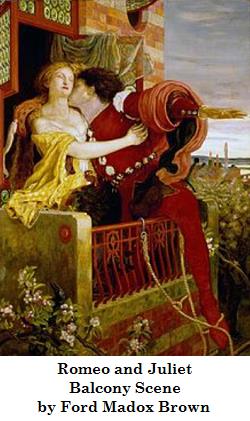 Classical Music for the Seasons
Music for the Seasons
Classical Music for the Seasons
Music for the Seasons

 Classical Music for the Seasons
Music for the Seasons
Classical Music for the Seasons
Music for the Seasons

Study the musical selection for one week.
Over the week:
Activity 1: Describe the Music
After listening to the music, describe and discuss what you heard.
Read the list of adjectives below. Select those that describe the music or think up additional adjectives.
Activity 2: Study a Painting of Romeo and Juliet
Romeo and Juliet were two characters in a play who fell in love. In the painting below, Romeo has climbed up to Juliet's balcony to visit her.
Find the following items in the below painting of Romeo and Juliet:

Activity 3: Practice Reciting Famous Lines from Shakespeare's play, 'Romeo and Juliet'
As you listen to the music, recite the following five lines from 'Romeo and Juliet.' Don't be afraid to inject some dramatic body movements into your recitations.
1) O Romeo, Romeo, wherefore art thou Romeo?
2) That which we call a rose by any other name would smell as sweet.
3) My bounty is as boundless as the sea, My love as deep; the more I give to thee, The more I have, for both are infinite.
4) Good night, good night! parting is such sweet sorrow
5) A pair of star-cross'd lovers